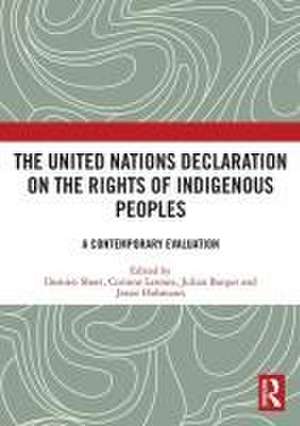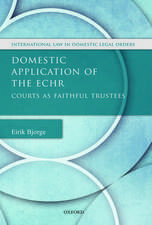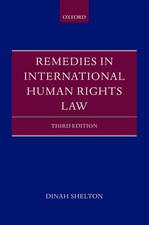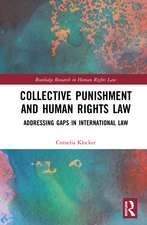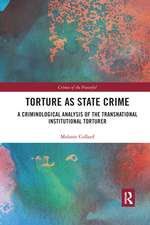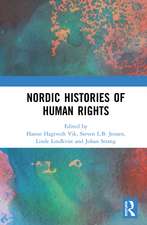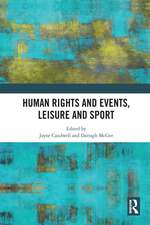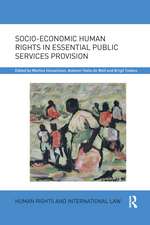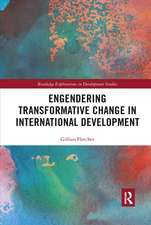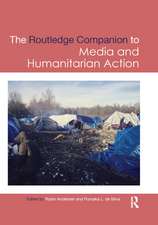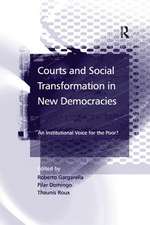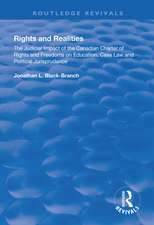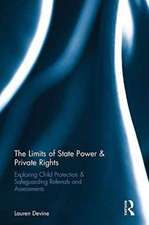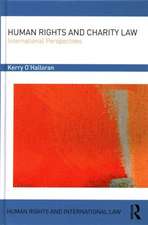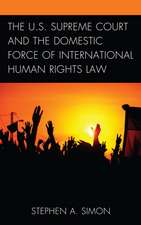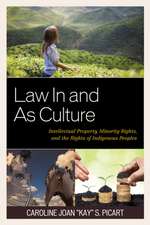The United Nations Declaration on the Rights of Indigenous Peoples: A Contemporary Evaluation
Editat de Damien Short, Corinne Lennox, Julian Burger, Jessie Hohmannen Limba Engleză Paperback – 25 sep 2023
The chapters in this collection offer a multi-disciplinary analysis of the UNDRIP as it enters the second decade since its adoption by the UN General Assembly in 2007. Following centuries of resistance by Indigenous peoples to state, and state sponsored, dispossession, violence, cultural appropriation, murder, neglect and derision, the UNDRIP is an achievement with deep implications in international law, policy and politics. In many ways, it also represents just the beginning – the opening of new ways forward that include advocacy, activism, and the careful and hard-fought crafting of new relationships between Indigenous peoples and states and their dominant populations and interests.
This book was originally published as a special issue of The International Journal of Human Rights.
| Toate formatele și edițiile | Preț | Express |
|---|---|---|
| Paperback (1) | 327.41 lei 6-8 săpt. | |
| Taylor & Francis – 25 sep 2023 | 327.41 lei 6-8 săpt. | |
| Hardback (1) | 1008.97 lei 6-8 săpt. | |
| Taylor & Francis – 30 noi 2020 | 1008.97 lei 6-8 săpt. |
Preț: 327.41 lei
Nou
Puncte Express: 491
Preț estimativ în valută:
62.66€ • 65.17$ • 51.73£
62.66€ • 65.17$ • 51.73£
Carte tipărită la comandă
Livrare economică 14-28 aprilie
Preluare comenzi: 021 569.72.76
Specificații
ISBN-13: 9780367619800
ISBN-10: 0367619806
Pagini: 328
Dimensiuni: 174 x 246 x 23 mm
Greutate: 0.54 kg
Ediția:1
Editura: Taylor & Francis
Colecția Routledge
Locul publicării:Oxford, United Kingdom
ISBN-10: 0367619806
Pagini: 328
Dimensiuni: 174 x 246 x 23 mm
Greutate: 0.54 kg
Ediția:1
Editura: Taylor & Francis
Colecția Routledge
Locul publicării:Oxford, United Kingdom
Public țintă
Postgraduate and UndergraduateCuprins
1. Introduction
Jessie Hohmann
2. The UNDRIP: an increasingly robust legal parameter
Felipe Gómez Isa
3. After the Declaration: next steps for the protection of indigenous peoples’ rights
Julian Burger
4. The UNDRIP and the legal significance of the right of indigenous peoples to self-determination: a human rights approach with a multidimensional perspective
Dorothée Cambou
5. Implementation of the UNDRIP around the world: achievements and future perspectives. The outcome of the work of the ILA Committee on the Implementation of the Rights of Indigenous Peoples
Federico Lenzerini
6. The World Bank’s new Environmental and Social Framework: some progress but many gaps regarding the rights of indigenous peoples
Corinne Lewis and Carl Söderbergh
7. Implementing free prior and informed consent: the United Nations Declaration on the Rights of Indigenous Peoples (2007), the challenges of REDD+ and the case for the precautionary principle
Malayna Raftopoulos and Damien Short
8. Towards new development paradigms: the United Nations Declaration on the Rights of Indigenous Peoples as a tool to support self-determined development
Jérémie Gilbert and Corinne Lennox
9. Creating a space for indigenous rights: the Universal Periodic Review as a mechanism for promoting the rights of indigenous peoples
Noelle Higgins
10. Looking back to move forward: the status of environmental rights under the UN Declaration on the Rights of Indigenous Peoples
Adriana Giunta
11. Treaty making and the UN Declaration on the Rights of Indigenous Peoples: lessons from emerging negotiations in Australia
Harry Hobbs
12. The self divided: the problems of contradictory claims to Indigenous peoples’ self-determination in Australia
Stephen M. Young
13. Indigenous rights and the legal politics of Canadian coloniality: what is happening to free, prior and informed consent in Canada?
Jeremy Patzer
14. A critical evaluation of the domestic standards of the right to prior consultation under the UNDRIP: lessons from the Peruvian case
Amelia Alva-Arévalo
15. Implementing the rights of indigenous peoples in Japan: implications and challenges of forest certification for the Ainu
Fumiya Nagai
16. The approach to UNDRIP within the African Regional Human Rights System
Lucy Claridge
17. Indigenous peoples’ rights in Morocco: subaltern narratives by Amazigh women
Silvia Gagliardi
18. Reflections on indigenous peoples’ rights vis-à-vis the law of occupation
Shlomit Stein
Jessie Hohmann
2. The UNDRIP: an increasingly robust legal parameter
Felipe Gómez Isa
3. After the Declaration: next steps for the protection of indigenous peoples’ rights
Julian Burger
4. The UNDRIP and the legal significance of the right of indigenous peoples to self-determination: a human rights approach with a multidimensional perspective
Dorothée Cambou
5. Implementation of the UNDRIP around the world: achievements and future perspectives. The outcome of the work of the ILA Committee on the Implementation of the Rights of Indigenous Peoples
Federico Lenzerini
6. The World Bank’s new Environmental and Social Framework: some progress but many gaps regarding the rights of indigenous peoples
Corinne Lewis and Carl Söderbergh
7. Implementing free prior and informed consent: the United Nations Declaration on the Rights of Indigenous Peoples (2007), the challenges of REDD+ and the case for the precautionary principle
Malayna Raftopoulos and Damien Short
8. Towards new development paradigms: the United Nations Declaration on the Rights of Indigenous Peoples as a tool to support self-determined development
Jérémie Gilbert and Corinne Lennox
9. Creating a space for indigenous rights: the Universal Periodic Review as a mechanism for promoting the rights of indigenous peoples
Noelle Higgins
10. Looking back to move forward: the status of environmental rights under the UN Declaration on the Rights of Indigenous Peoples
Adriana Giunta
11. Treaty making and the UN Declaration on the Rights of Indigenous Peoples: lessons from emerging negotiations in Australia
Harry Hobbs
12. The self divided: the problems of contradictory claims to Indigenous peoples’ self-determination in Australia
Stephen M. Young
13. Indigenous rights and the legal politics of Canadian coloniality: what is happening to free, prior and informed consent in Canada?
Jeremy Patzer
14. A critical evaluation of the domestic standards of the right to prior consultation under the UNDRIP: lessons from the Peruvian case
Amelia Alva-Arévalo
15. Implementing the rights of indigenous peoples in Japan: implications and challenges of forest certification for the Ainu
Fumiya Nagai
16. The approach to UNDRIP within the African Regional Human Rights System
Lucy Claridge
17. Indigenous peoples’ rights in Morocco: subaltern narratives by Amazigh women
Silvia Gagliardi
18. Reflections on indigenous peoples’ rights vis-à-vis the law of occupation
Shlomit Stein
Notă biografică
Damien Short is Co-Director of the Human Rights Consortium at the School of Advanced Study, University of London, UK and a Professor in Human Rights. He has spent much of his career researching and writing on indigenous peoples’ rights and reconciliation debates issues in Australia, a monograph on which, Reconciliation and Colonial Power: indigenous rights in Australia, was published by Ashgate in 2008. Since then he has researched memory and genocide in Australia, publishing his work in Memory Studies, the International Journal of Human Rights and the Journal of Genocide Research. More recently, he has researched the impacts of Tar Sands production in Alberta, Canada on downstream indigenous communities. He is a frequent contributor to the United Nations Expert Mechanism on the Rights of Indigenous Peoples and is the Editor in Chief of the International Journal of Human Rights.
Corinne Lennox is Senior Lecturer in Human Rights at the Institute of Commonwealth Studies, and Co-Director of the Human Rights Consortium, School of Advanced Study, University of London, UK. Her research focuses on issues of minority and indigenous rights protection, civil society mobilisation for human rights, and on human rights and development. She has worked for many years as a human rights practitioner and trainer with various NGOs, including at Minority Rights Group International (MRG). She has been a consultant on minority and indigenous rights for the UNDP, the UN Office of the High Commissioner for Human Rights and several governments. She is a regular contributor to the annual State of the World’s Minorities and Indigenous Peoples Report (MRG) and has published on transnational dimensions of minority and indigenous rights, including in her recent book Transnational Social Mobilisation and Minority Rights: Identity, Advocacy and Norms (Routledge 2020).
Julian Burger is Fellow of the Human Rights Consortium, School of Advanced Study, University of London and Visiting Professor at the Human Rights Centre at the University of Essex in the UK. He is also Visiting Professor at the University of Alcala de Henares, Spain. Before taking up his University appointments, he worked at the United Nations Office of the High Commissioner for Human Rights for 20 years during which time he headed the programme on indigenous peoples and minorities. During this period, he organized the discussions on the Declaration on the Rights of Indigenous Peoples and helped launch the principle human rights mechanisms on indigenous peoples - the Special Rapporteur, Permanent Forum on Indigenous Issues and the Expert Mechanism on the Rights of Indigenous Peoples. He also helped establish inter-agency networks of UN organizations to improve integration of indigenous and minority rights into development programmes. He has visited indigenous and minority communities in many parts of the world and has published books and articles on indigenous peoples and human rights since the 1980s.
Jessie Hohmann has broad research and teaching interests in the areas of international law, human rights (with a particular focus on the right to housing), Indigenous peoples in international law, and the material and visual culture of international law. She is currently Associate Professor in the Faculty of Law at the University of Technology Sydney, Australia. She has degrees from Sydney University, Osgoode Hall Law School of York University, Canada, and the University of Guelph. She has previously held appointments at Queen Mary, University of London, the University of Cambridge, King’s College, London and Macquarie University in Sydney.
Corinne Lennox is Senior Lecturer in Human Rights at the Institute of Commonwealth Studies, and Co-Director of the Human Rights Consortium, School of Advanced Study, University of London, UK. Her research focuses on issues of minority and indigenous rights protection, civil society mobilisation for human rights, and on human rights and development. She has worked for many years as a human rights practitioner and trainer with various NGOs, including at Minority Rights Group International (MRG). She has been a consultant on minority and indigenous rights for the UNDP, the UN Office of the High Commissioner for Human Rights and several governments. She is a regular contributor to the annual State of the World’s Minorities and Indigenous Peoples Report (MRG) and has published on transnational dimensions of minority and indigenous rights, including in her recent book Transnational Social Mobilisation and Minority Rights: Identity, Advocacy and Norms (Routledge 2020).
Julian Burger is Fellow of the Human Rights Consortium, School of Advanced Study, University of London and Visiting Professor at the Human Rights Centre at the University of Essex in the UK. He is also Visiting Professor at the University of Alcala de Henares, Spain. Before taking up his University appointments, he worked at the United Nations Office of the High Commissioner for Human Rights for 20 years during which time he headed the programme on indigenous peoples and minorities. During this period, he organized the discussions on the Declaration on the Rights of Indigenous Peoples and helped launch the principle human rights mechanisms on indigenous peoples - the Special Rapporteur, Permanent Forum on Indigenous Issues and the Expert Mechanism on the Rights of Indigenous Peoples. He also helped establish inter-agency networks of UN organizations to improve integration of indigenous and minority rights into development programmes. He has visited indigenous and minority communities in many parts of the world and has published books and articles on indigenous peoples and human rights since the 1980s.
Jessie Hohmann has broad research and teaching interests in the areas of international law, human rights (with a particular focus on the right to housing), Indigenous peoples in international law, and the material and visual culture of international law. She is currently Associate Professor in the Faculty of Law at the University of Technology Sydney, Australia. She has degrees from Sydney University, Osgoode Hall Law School of York University, Canada, and the University of Guelph. She has previously held appointments at Queen Mary, University of London, the University of Cambridge, King’s College, London and Macquarie University in Sydney.
Descriere
This book offers an insightful and nuanced contemporary evaluation of the progress and challenges that indigenous peoples have faced in securing the implementation of UNDRIP, as well as its normative impact, at both the national and international levels.
